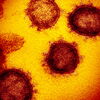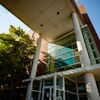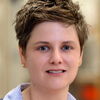2021-03-02
- The liver has a rare superpower among body organs – the ability to regenerate, even if 70% of its mass is removed. It also keeps up its metabolic and toxin-removing work during the process of regeneration, thanks to a subset of cells that expand their workload while the rest focus on multiplication, a new study in mice found.
- 2021-03-01 - Chris Brooke, assistant professor of microbiology, recently spoke with The 21st public radio show about what scientists know about the virus that causes COVID-19, the emerging variants, and what they still have to learn.
- 2021-02-24 - Inflammasomes play a critical role in the innate cellular immune response to pathogen infection. The inflammasome, a cytosolic multiprotein complex, recognizes substrates produced during infection or tissue damage, and triggers an inflammatory response by releasing the proinflammatory cytokine IL-1β and IL-18. Researchers have recently identified bromodomain-containing protein-4 (Brd4) as a key...
- 2021-02-23 - In a new publication, University of Illinois PhD graduate Liguo Zhang of the Belmont laboratory and colleagues introduce an improved version of TSA-seq and use it to demonstrate how changes in gene association with nuclear speckles correlate with changes in gene expression.
- 2021-02-22 - Professor John. E. Cronan, Microbiology Alumni Professor and professor of biochemistry at the University of Illinois, is a leading researcher and innovator in the field of lipid metabolism. His recent work focuses on the synthesis of biotin and its building blocks across different species of bacteria. His publication with biochemistry graduate student Yuanyuan Hu uncovers the mechanism for...
- 2021-02-18 - Congratulations to Cari Vanderpool, professor of microbiology, who was recently elected a fellow in the American Academy of Microbiology.
- 2021-02-15 - An international team of researchers including Nicholas Wu, a professor in the Department of Biochemistry, has published a new study which developed highly potent molecules that can neutralize SARS-CoV-2 by simultaneously targeting multiple sites of vulnerability on the virus.
- 2021-02-12 - Several faculty from the School of Molecular & Cellular Biology were among the most-cited researchers in the world in a new, widely hailed analysis designed to provide a clearer view of scientific and scholarly impact.
- 2021-02-10 - Obesity is rising in prevalence and poses a major concern for the health of our general population. Currently affecting over one-third of the population of the United States, obesity is often comorbid with other diseases, such as diabetes, fatty liver disease, cardiovascular disease, and some cancers. The bile acid (BA)-sensing nuclear receptor Farnesoid X-Receptor (FXR) is not only a key...
- 2021-01-27 - Dietary fiber found in grains is a large component of many diets, but little is understood about how we digest the fiber, as humans lack enzymes to break down the complex molecules. Some species of gut bacteria break down the fiber in such a way that it not only becomes digestible, but releases ferulic acid, an important antioxidant with multiple health benefits, according to a new study led by...
- 2021-01-21 - In a new study, University of Illinois professor Jie Chen and collaborators have uncovered novel molecular mechanisms of regulation in skeletal muscle regeneration.
- 2021-01-20 - Professor Yu was one of ten new faculty hires made in the School of Molecular and Cellular Biology in the last three years. Yu is an assistant professor of molecular and integrative physiology and is an affiliate of the Beckman Institute.
- 2021-01-20 - Professor Wu was one of ten new faculty hires made in the School of Molecular and Cellular Biology in the last three years. Wu is an assistant professor of and is an affiliate of the Carl R. Woese Institute for Genomic Biology.
- 2021-01-20 - Professor Stadtmueller was one of ten new faculty hires made in the School of Molecular and Cellular Biology in the last three years. Stadtmueller is an assistant professor of biochemistry, assistant professor of Biomedical and Translational Sciences with the Carle Illinois College of Medicine, and is an affiliate of the Beckman Institute.
- 2021-01-20 - Professor Sokac was one of ten new faculty hires made in the School of Molecular and Cellular Biology in the last three years. Sokac is an associate professor of cell and development biology. She is also a SCIALOG Fellow with Research Corporation for Science Advancement, a Master Facilitator/Consultant with National Research Mentoring Network, and a Master Facilitator/Consultant with the Center...













